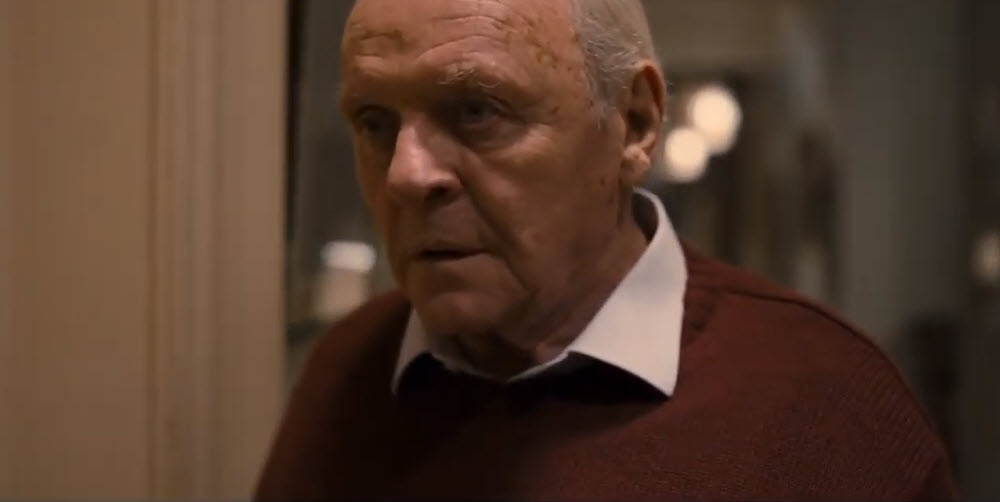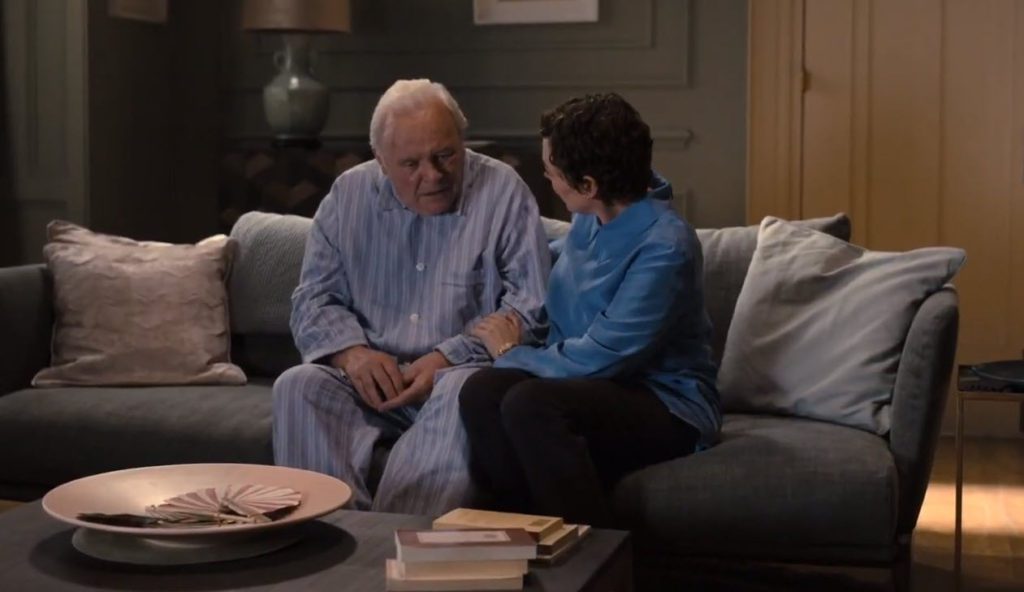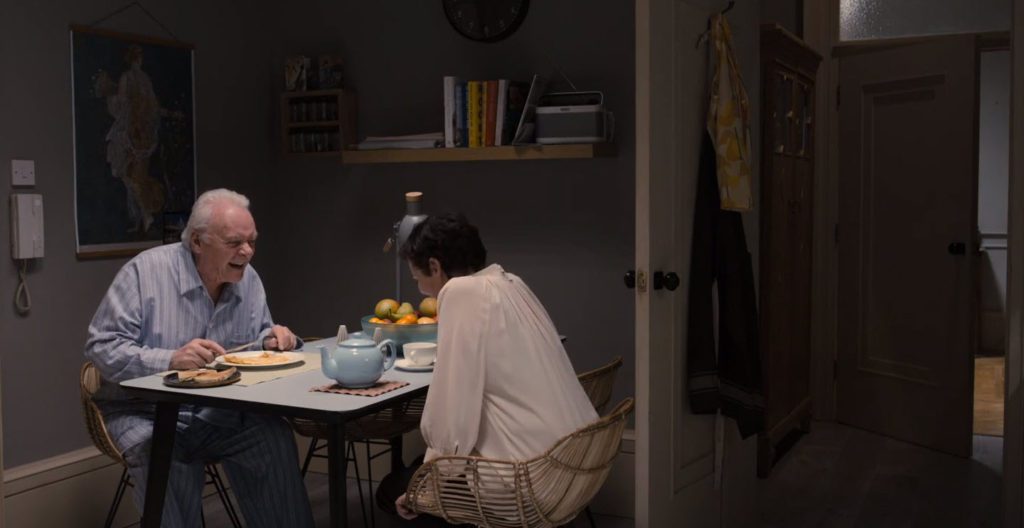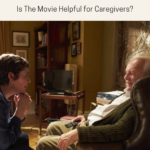
Have you heard about The Father? There have been some amazing The Father reviews, focusing on the film’s portrayal of dementia and family relationships. It follows the character of Anthony (played by Anthony Hopkins) and his daughter Anne (played by Olivia Colman). Anthony Hopkins won an Academy Award for his role, while Olivia Colman was nominated as Best Supporting Actress. That should give you some idea of the quality of acting involved.
It’s an impressive film all around, one that delves into a difficult and emotional topic, yet does so with compassion and surprising realism.
Here at Kapok, we were fascinated with the film came out, so we watched it for ourselves. We were interested to see how well The Father tackles dementia and families – along with whether it does so accurately.
So, in this The Father review I’ll be talking about my thoughts after watching The Father and the lessons that the film has for caregivers.
My Experience Of The Father

Let’s start this The Father review by talking about The Father just as a film.
I found it fascinating and complex in equal measure. Like many audience members, I went into the film knowing that the main character has Alzheimer’s disease and that some of the film is told from his perspective.
Well… that’s not quite right.
The film is still told in the traditional third-person manner and we see scenes that Anthony wouldn’t have been privy to and don’t appear to be imagined.
The difference is that the audience’s sense of reality is twisted in the same way that Anthony’s is. Time becomes distorted and everything is presented as if it was real and happening in that moment, even when it’s clear that this isn’t the case at all.
At times, Anthony is living in his own apartment. At others, he appears to be living with his divorced daughter Anne. Then there’s a man in the picture too. Her husband, it seems, even though Anne claimed to be single just moments earlier.
The shifts and changes start slowly.
For a while, it seems like Anthony is competent and that the film begins before he is experiencing any serious issues. It doesn’t take long for the cracks to begin to show and that’s where the real ride begins.
If you pay attention, you might notice strange shifts in the environment too, like the kitchen cabinets being a different color from one scene to the next or a lamp moving position.
The reason is that Anthony’s mind is blurring multiple memories together – at times living with his daughter and her then-husband, later living with his daughter alone after her divorce, then being told that his daughter is leaving for Paris.
This style of storytelling means that The Father isn’t a film you can relax to. You need to pay close attention to see what is going on and, even then, you’ll probably be confused much of the time. That’s okay though. The confusion is part of the point and is masterfully done.
It’s A Difficult Movie To Watch – In More Ways Than One
Let’s get one thing straight. The Father isn’t an easy film to watch.
The subject matter alone makes it difficult. While between 5% and 8% of the population over 60 lives with dementia, the topic is one we often avoid.
There’s a fear surrounding dementia. Perhaps this isn’t so surprising, as there’s no cure for the condition, it can seem to come out of nowhere, and many of us have no idea what to expect. If you know someone with dementia, as many of us do, then The Father might be even more emotional for you.
This isn’t the type of movie to give you a feel-good ending either. That type of ending wouldn’t feel right for an illness like dementia that gets worse over time.
The Father is also confusing.
At the beginning, it looks like any other film. But, it isn’t long before you realize that the storyline doesn’t make sense. There’s confusion about whether Anne is married or not, whether Anthony is living in his own apartment or hers, and who different people are.
The confusion is all intentional, as the director wanted the audience to have an experience much like Anthony’s own. As part of this, there’s no easy way to tell what is actually occurring, what is a memory, what is a dream, and what isn’t happening at all.
In fact, if you didn’t know the subject matter of the film, you might initially think that it is a psychological thriller, where the people in Anthony’s life are manipulating and taking advantage of him.
After watching the movie once, you might still be confused about the real sequence of events versus Anthony’s experience.
Honestly, I didn’t fully understand the events of the movie until I read a review a little alter on.
Still, the confusion in the movie is part of the point. One of the main take-home messages of the movie is that dementia patients often don’t understand what’s happening around them.
The Father is powerful in this sense. It shows the complexity of dementia and highlights the fact that people with the condition aren’t just forgetting things – their entire sense of reality is being shifted.
Is The Father Real?
While The Father isn’t based on a true story, the writer and director Florian Zeller was inspired by his grandmother, who started showing dementia symptoms when Florian was just 15.
This source of inspiration may be why the movie feels so authentic and is well-crafted throughout.
Is The Father Accurate?
The Father tries to do two things. It tries to show you what a dementia patient’s behavior looks like from the outside, while also getting you to understand the confusion in their mind. It’s a difficult balance to get right.
Plus, to complicate matters, there’s still plenty that we don’t understand about the experience of dementia. The condition influences how a person perceives the world, their memories, and their self, which naturally makes objective communication all but impossible.
Problems With The Father

There are a few big limitations with The Father.
The first is that the viewer only sees Anthony in the throes of dementia. This makes it impossible which parts of his behavior, like his displays of temper or apparent cruelty are due to his disease. Some of his behaviors could have been a part of his personality previously.
Similarly, it’s difficult for the viewer to know what is happening in Anthony’s life versus how he sees things.
These issues appear to be intentional, as they help with the storytelling of the film, keeping the audience the audience in the dark about what is happening for much of the film.
Still, the lack of distinction between what is Alzheimer’s disease and what isn’t may be frustrating if you’re wanting to learn more about the condition.
Another issue is that the film has a limited scope.
This is partly because it covers a single family and also because relatively few events are highlighted. For example, the film doesn’t touch on incontinence at all or the way that Alzheimer’s patients often lose their way, even in their own homes.
The focus on caregiving is limited too. Viewers don’t get to see many of the challenges that caregivers of dementia patients face, like trying to get family members to bathe or to eat.
Finally, like many movies about dementia, The Father takes a fairly nihilistic approach.
Viewers watch Anthony’s decline and there’s a sense of despair and loss. Yet, while Alzheimer’s disease is horrible, there are other ways to frame the transitions too.
A person with Alzheimer’s disease might not be able to remember the past or connect to people in the same way anymore, but they are still there in the moment. This is one reason why dementia care often focuses on compassion and kindness.
Indeed, trying to center people back in the moment might not even be the best practice. Some experts suggest therapeutic lying, which helps caregivers to simply connect with care recipients, rather than trying to bring their family member back to reality.
Dementia On Film
The Father isn’t the first movie to tackle dementia. Other popular movies have done so, with varying degrees of success.
The Notebook is probably the most famous example. Unfortunately, that movie is also limited and presents a misleading version of dementia, showing sudden sharp shifts from lucid to non-lucid that don’t match reality. The movie also muddles some aspects of the stages and progression of dementia.
Still Alice is a better choice. This movie follows a woman diagnosed with early-onset Alzheimer’s, focusing on her attempts to cope and the impacts on her family.
There’s also Supernova.
Supernova follows a couple, one of whom has frontotemporal dementia. This is a less common condition than Alzheimer’s disease (which was depicted in The Father) and Supernova portrays this form of dementia well.
Supernova and Still Alice are both good depictions of dementia, so they’re well-worth a look. Neither has the same sense of being ‘in’ the condition that you get with The Father, but do end up with a more coherent sense of what is happening, which is helpful.
These films may both be interesting for caregivers too, as they feature children and a spouse of the person with dementia, along with some of the emotions that come with the journey.
Our The Father Review – Should You Watch It?
While The Father isn’t an easy movie, it’s one we highly recommend. I’m even thinking of watching it again for myself.
The Father does something that other films on dementia don’t achieve, it gives you a sense of why dementia patients behave like they do. It helps to show just how confusing and overwhelming dementia can be, and how it goes far beyond memory loss.
The information can help you to be compassionate to family members with dementia.
It also shows, quite clearly, why caregivers often need to tell dementia patients the same things many times – and why, even then, the patient might not remember at all.
Finally, the movie is an important reminder that sometimes you need to let someone else take care of your family member. This can be a heart-wrenching decision, but the safety and predictability of a nursing home is sometimes much more helpful for a senior than anything you could provide.
While The Father is insightful, it won’t teach you much about providing care for someone with dementia. For that, you’ll need something more comprehensive. There’s a book called The 36-Hour Day that is a brilliant place to begin.
The book is currently in its 6th edition and provides many specific instructions and ideas for supporting a loved one with dementia. There are also some interesting parts that step you through what dementia is and what it means, giving you a better introduction than you could ever get from a movie.
Feeling Overwhelmed?
Check out our Caregiving Consulting service for personalized support and guidance.


Leave a Reply